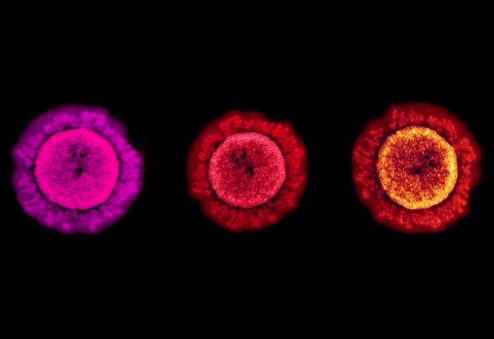Nikhil Prasad Fact checked by:Thailand Medical News Team Dec 28, 2024 3 months, 3 weeks, 5 days, 14 hours, 48 minutes ago
Medical News: As the world continues its efforts to contain the COVID-19 pandemic, new variants of the SARS-CoV-2 virus have emerged, threatening global public health once again. Researchers from the University of Missouri-USA, and Usmanu Danfodiyo University-Nigeria, have highlighted the dangers posed by three new variants: KP.3.1.1, XEC, and MC.1. These variants show unique characteristics, raising concerns over their transmissibility, immune evasion, and potential impact on vaccine efficacy. This
Medical News report delves into the findings and implications of these new developments.
 Researchers Sound Alert Over New SARS-CoV-2 KP.3.1.1, XEC, and MC.1 Variants
KP.3.1.1 Variant
Researchers Sound Alert Over New SARS-CoV-2 KP.3.1.1, XEC, and MC.1 Variants
KP.3.1.1 Variant
The KP.3.1.1 variant is a descendant of the KP.3 strain from the JN.1 lineage. It features mutations in the spike protein, including R346T, F456L, and Q493E. These mutations enhance its ability to evade immune responses and increase its infectivity. According to the Centers for Disease Control and Prevention (CDC), this variant has demonstrated a significant reduction in neutralization by convalescent sera, indicating it can bypass immunity gained from prior infections. Furthermore, KP.3.1.1’s higher transmission rate across multiple regions could contribute to localized outbreaks or even broader pandemics, stressing the need for close monitoring and preventive measures.
XEC Variant: A Recombinant Threat
The XEC variant emerges as a recombinant lineage derived from KS.1.1 (JN.13.1.1.1) and KP.3.3 (JN.1.11.1.3.3). Researchers, including those led by Kaku et al., have noted the genetic complexity of this variant. The recombination event led to two notable spike protein substitutions: S:T22N and S:F59S. These changes, along with a genomic breakpoint at positions 21,738 to 22,599, significantly alter the virus’s characteristics. The XEC variant’s mutations, concentrated in the spike and nucleocapsid genes, increase its adaptability against vaccines and diagnostic tools. This variant underscores the potential for SARS-CoV-2 to evolve through genetic recombination, complicating efforts to predict and manage its spread.
The Omicron-Derived MC.1 Variant
The MC.1 variant originates from the Omicron lineage, carrying a unique mutation profile that enhances both its transmissibility and immune evasion capabilities. Like other Omicron subvariants, it exhibits modifications in receptor binding kinetics, potentially impacting its interaction with the human immune system. These changes could weaken the effectiveness of existing vaccines and therapeutics. Public health experts emphasize the importance of understanding the MC.1 variant’s mutations to design more robust intervention strategies.
Implications for Public Health
The emergence of these variants underscores the virus’s ability to adapt and challenge existing public health measures. The increased transmissibility of these strains could overwhelm healthcare systems, especially in regions with limited resources. Moreover, their ability to evade immune re
sponses raises concerns about the effectiveness of current vaccines and natural immunity. These developments call for a reassessment of global vaccination strategies, including the development of updated booster shots tailored to these variants.
Role of Genomic Surveillance
Genomic surveillance (GS) remains a critical tool in monitoring the evolution and spread of SARS-CoV-2. By analyzing genetic changes in the virus, researchers can anticipate its potential impact on transmissibility, severity, and vaccine efficacy. GS enables scientists to design targeted public health responses, refine diagnostic tools, and optimize vaccine formulations. The researchers from both institutions stress the need for robust genomic surveillance systems worldwide to mitigate the risks posed by emerging variants.
Revisiting Preventive Measures
Given the challenges posed by KP.3.1.1, XEC, and MC.1, experts advocate for a return to comprehensive preventive measures. This includes reinforcing the use of masks, maintaining physical distancing, and implementing travel restrictions where necessary to curb cross-border transmission. Governments and public health authorities must also strengthen healthcare infrastructure to handle potential surges in cases caused by these variants.
Vaccine Development and the One Health Approach
The evolution of SARS-CoV-2 variants highlights the need for dynamic vaccine development. Researchers recommend designing booster shots that account for the unique characteristics of these new variants. Additionally, the One Health approach, which considers the interconnected health of humans, animals, and the environment, is critical in controlling the virus’s evolution. This holistic strategy can help mitigate the risks of zoonotic spillovers and environmental reservoirs contributing to the spread of SARS-CoV-2.
Future Directions
The findings from the collaborative research efforts of the University of Missouri and Usmanu Danfodiyo University provide a deeper understanding of the threats posed by KP.3.1.1, XEC, and MC.1. These variants demonstrate how genetic mutations can enhance a virus’s transmissibility and immune evasion capabilities. The study emphasizes the importance of ongoing surveillance and international cooperation in addressing the challenges posed by SARS-CoV-2.
Conclusion
In conclusion, the emergence of the KP.3.1.1, XEC, and MC.1 variants serves as a stark reminder of the evolving nature of SARS-CoV-2. These variants highlight the virus’s ability to adapt and evade existing public health measures, posing significant challenges to global health security. Researchers stress the urgent need for enhanced genomic surveillance, robust vaccine development, and the adoption of the One Health approach to mitigate the risks associated with these variants. Governments, healthcare systems, and individuals must remain vigilant and proactive in combating this evolving threat. By prioritizing research, collaboration, and preventive measures, the global community can better address the challenges posed by emerging SARS-CoV-2 variants.
The warnings were published as a correspondence in the peer-reviewed journal: Bulletin of the National Research Centre.
https://link.springer.com/article/10.1186/s42269-024-01294-z
For the latest COVID-19 News, keep on logging to Thailand
Medical News.
Read Also:
https://www.thailandmedical.news/news/columbia-study-warns-that-covid-19-kp-3-1-1-and-xec-variants-are-highly-immune-evasive-than-even-jn-1-or-kp-3
https://www.thailandmedical.news/news/new-american-study-finds-that-sars-cov-2-s-xec-variant-shows-alarming-ability-to-evade-immunity-and-boosts-infectivity
https://www.thailandmedical.news/news/latest-updates-show-that-a-new-sars-cov-2-variant-called-mv-1-is-likely-to-be-the-next-contender-to-xec-variant
https://www.thailandmedical.news/news/new-recombinant-sars-cov-2-variant-xek-likely-to-be-the-next-predominant-strain-by-late-winter-superseding-xec
